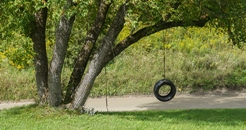 In our efforts to protect, are we increasing children's anxiety?
In our efforts to protect, are we increasing children's anxiety?
Today's parenting style, where children are shuttled from one supervised, structured activity to another, and the fear of letting children roam, has decreased the amount of free play that children have. To become a confident, competent adult, should children go outside more, make their own mistakes and figure things out? Putting children in control helps them learn to solve problems, and cope better in new environments.
Dr. Peter Gray, research professor at Boston College who focuses on child play, says that erring on the side of caution isn't helping children. By trying to give children a leg up, scheduling every free minute with karate or tutors or music lessons, parents are in fact doing them harm.
Dr Gray says that over the past 50 years, as they've seen a decline in children's freedom in the USA, they've seen an increase in responses on standardised questionnaires that indicate both depression and anxiety disorders. Specifically, an eight-fold increase on depression, and five-to-ten-fold increase on generalized anxiety disorder.
Dr Gray notes that this is just a correlation, and he's looked at many possible explanations. He's found it doesn't correlate with economic cycles, wars, or divorce rates. But it correlates very well with the decline of children's freedom to play. Dr Gray suggests that this decline decreases the degree to which you feel that you're in control of your own life (internal control), versus the degree you feel you're a victim of fate and circumstance and other people (external control). He reports that every decade, young people report less internal control and more external control.
Giving children time for free play provides them with opportunities to communicate, to collaborate, to fail, to learn, to problem-solve which helps them to become confident and successful adults in a global society.
A 'Let Grow' movement in schools in the USA is advocating that some homework should actually be free play - participating kids decide to do something on their own that they haven't done before e.g. walking the dog around the district, etc. The schools have also set up "Let Grow play clubs" - mixed ages, no structure, and no adult direction. Just free, child-led play. Participating schools have seen a direct effect in the classroom - children were more self-assured, and confident.
Retweet about this article:
Geoff Knott, 24/10/2018